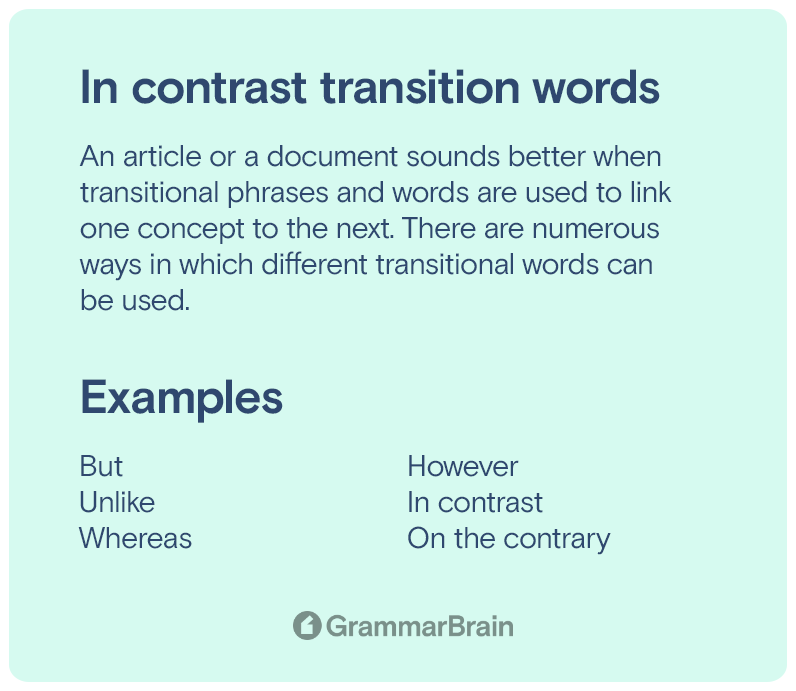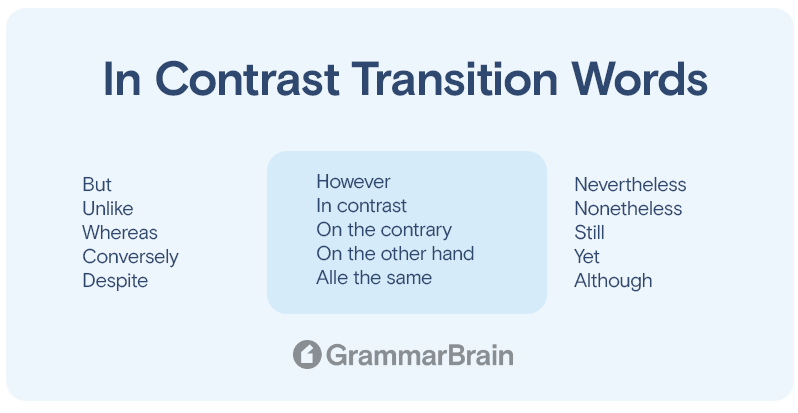An article or a document sounds better when transitional phrases and words are used to link one concept to the next. There are numerous ways in which different transitional words can be used. Compare or contrast transitional words are used to point out differences or alternatives in a sentence.
Different types of “in contrast” transition words
The “in contrast” transition words can be classified on the basis of the ideas they convey in a sentence.

Transition words providing contrast emphasis
These “in contrast” transition words are used when presenting information that differs from what has already been written or spoken, or from what might be predicted in light of a prior point. Some common transition words providing contrast emphasis and their examples are given below:
Word:
but
Example:
I have gastritis but I love spicy food.
Word:
unlike
Example:
Jenna can dance well, unlike her brother James.
Word:
whereas
Example:
I am working in advertising, whereas my sister is working as a software programmer.
Word:
conversely
Example:
She usually orders vegetarian, but he, conversely, tends to order non-vegetarian.
Word:
however
Example:
I love that shirt; however, it does not fit me properly.
Word:
in contrast
Example:
All the proofs submitted to the court were in contrast to his testimony.
Word:
on the contrary
Example:
The food is not that bad; on the contrary, it tastes delicious.
Word:
On the one hand… On the other hand
Example:
On the one hand, I love the joy and satisfaction that come with starting a business, but on the other hand, I am worried about financial insecurity.
Transitional phrases to indicate contrast in a result
We can also use transitional phrases and words when discussing how something happened as opposed to what was anticipated. Some common transition words indicating contrast in a result and their examples are given below:
Word:
all the same
Example:
We started late from New York but reached Chicago on time, all the same.
Word:
even so
Example:
My father does not like cats; even so, he took care of my two cats.
Word:
in spite of
Example:
He was always smiling in spite of his terrible illness.
Word:
nevertheless
Example:
The French test was quite easy; nevertheless, he got a bad grade.
Word:
nonetheless
Example:
Though the dog looks harmless, I am afraid of it nonetheless.
Word:
still
Example:
My grandmother is 90 and still goes on a walk every morning.
Word:
yet
Example:
I am going to London tomorrow, yet John has refused to return my book.
Word:
although
Example:
Although Jonah was sick, he went to watch the football match.
Word:
Example:
Annie enjoyed the carnival, despite the sweltering heat.
Word:
even though
Example:
He was fired from the company even though he put in his best work.
In contrast transition words for contrasting suggestions and solutions
These words are used to indicate that your solution or suggestion contrasts with some other suggestion. Some common words include:
Word:
alternatively
Example:
We could try the new cafe down the road, or alternatively, we could go to our usual place.
Word:
instead of
Example:
Lily used oil instead of butter in the dish, and it tasted bad.
Exercise on in contrast transition words
Now that “in contrast” transition words have been discussed in detail, use the practice assignment provided below to assess your understanding of “in contrast” transition words. Identify if the correct “in contrast” transition words are used in the sentences given below. If not, correct the sentences with the appropriate “in contrast” transition words.
- Jenna is really good at cooking, unlike Anna, who adds extra salt to every dish.
- The movie was interesting on the other hand it was difficult to understand.
- Jacob refused to take the umbrella in spite of it was raining buckets.
- My dogs love going to the park in comparison to going to the beach.
- The company has increased the export of its products even though international sales remain unchanged over the years.
- James needed to go to New York urgently, despite he would have waited for you to arrive.
- Instead of going on a vacation this year, we decided to have a staycation.
- Susie ordered tea on the contrary she got coffee.
- The previous prime minister was weel-like among the citizens in contrast to the present one.
- Notwithstanding an excellent defense, he was convicted.
FAQs
What are the common mistakes that can be easily avoided when using “in contrast” transition words?
- Avoid using transitions excessively: Although the purpose of “in contrast” transition words is to help readers follow along with your writing, employing them excessively may have the reverse effect and leave readers confused.
- Ensure the sentence sounds logical after using transitions: The “in contrast” transition words show the difference between ideas and words. So, if the link they suggest isn’t clear or doesn’t exist, the reader may misinterpret the intended idea.
- Avoid other grammatical or syntax errors: The “in contrast” transition words need to be used carefully to avoid mistakes like comma splices and sentence fragments.
What is the difference between “in contrast” and “compare” transition words?
The “in contrast” words show differing or contrasting arguments whereas “compare” transition words show similar facts or ideas that lend credence to a statement.

Sources:
- Merriam-Webster – by/in contrast
- The Writing Center – Transitions (ESL)
- ESL Forums – List of 30+ Useful Contrast Transition Words for Writing Essay
- PapersOwl – Transition Words For A Compare And Contrast Essay
Inside this article
Fact checked:
Content is rigorously reviewed by a team of qualified and experienced fact checkers. Fact checkers review articles for factual accuracy, relevance, and timeliness. Learn more.
Core lessons
Glossary
- Abstract Noun
- Accusative Case
- Anecdote
- Antonym
- Active Sentence
- Adverb
- Adjective
- Allegory
- Alliteration
- Adjective Clause
- Adjective Phrase
- Ampersand
- Anastrophe
- Adverbial Clause
- Appositive Phrase
- Clause
- Compound Adjective
- Complex Sentence
- Compound Words
- Compound Predicate
- Common Noun
- Comparative Adjective
- Comparative and Superlative
- Compound Noun
- Compound Subject
- Compound Sentence
- Copular Verb
- Collective Noun
- Colloquialism
- Conciseness
- Consonance
- Conditional
- Concrete Noun
- Conjunction
- Conjugation
- Conditional Sentence
- Comma Splice
- Correlative Conjunction
- Coordinating Conjunction
- Coordinate Adjective
- Cumulative Adjective
- Dative Case
- Determiner
- Declarative Sentence
- Declarative Statement
- Direct Object Pronoun
- Direct Object
- Diction
- Diphthong
- Dangling Modifier
- Demonstrative Pronoun
- Demonstrative Adjective
- Direct Characterization
- Definite Article
- Doublespeak
- False Dilemma Fallacy
- Future Perfect Progressive
- Future Simple
- Future Perfect Continuous
- Future Perfect
- First Conditional
- Irregular Adjective
- Irregular Verb
- Imperative Sentence
- Indefinite Article
- Intransitive Verb
- Introductory Phrase
- Indefinite Pronoun
- Indirect Characterization
- Interrogative Sentence
- Intensive Pronoun
- Inanimate Object
- Indefinite Tense
- Infinitive Phrase
- Interjection
- Intensifier
- Infinitive
- Indicative Mood
- Participle
- Parallelism
- Prepositional Phrase
- Past Simple Tense
- Past Continuous Tense
- Past Perfect Tense
- Past Progressive Tense
- Present Simple Tense
- Present Perfect Tense
- Personal Pronoun
- Personification
- Persuasive Writing
- Parallel Structure
- Phrasal Verb
- Predicate Adjective
- Predicate Nominative
- Phonetic Language
- Plural Noun
- Punctuation
- Punctuation Marks
- Preposition
- Preposition of Place
- Parts of Speech
- Possessive Adjective
- Possessive Determiner
- Possessive Case
- Possessive Noun
- Proper Adjective
- Proper Noun
- Present Participle
- Prefix
- Predicate



